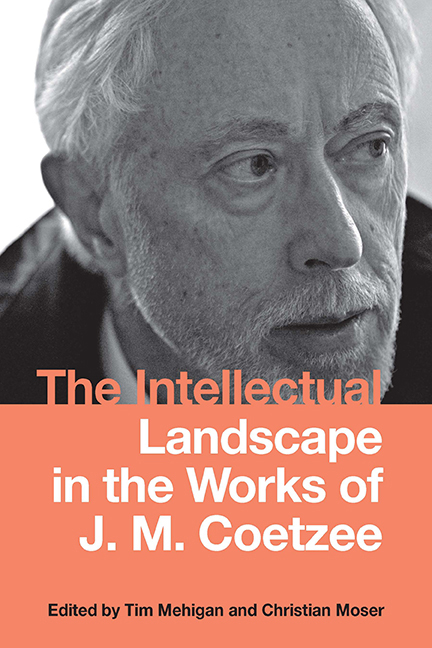Book contents
- Frontmatter
- Contents
- Acknowledgments
- Introduction: Coetzee's Intellectual Landscapes
- Part I Truth and Justification
- Part II Objectivity and Communication
- 6 Faith, Irony, Salt, and Possible Impossibilities: J. M. Coetzee's The Childhood of Jesus in Conversation with Zbigniew Herbert's “From Mythology”
- 7 Coetzee's Ethics of Language(s)
- 8 Force Fields
- 9 The Reading of Don Quixote: Literature's Migration into a New World
- 10 The Lives of Animals: From Rational Language to Speaking (of) Lions
- Part III Convergence of Interpretative Horizons and Moral Solidarity
- Notes on the Contributors
- Index
8 - Force Fields
from Part II - Objectivity and Communication
Published online by Cambridge University Press: 03 July 2019
- Frontmatter
- Contents
- Acknowledgments
- Introduction: Coetzee's Intellectual Landscapes
- Part I Truth and Justification
- Part II Objectivity and Communication
- 6 Faith, Irony, Salt, and Possible Impossibilities: J. M. Coetzee's The Childhood of Jesus in Conversation with Zbigniew Herbert's “From Mythology”
- 7 Coetzee's Ethics of Language(s)
- 8 Force Fields
- 9 The Reading of Don Quixote: Literature's Migration into a New World
- 10 The Lives of Animals: From Rational Language to Speaking (of) Lions
- Part III Convergence of Interpretative Horizons and Moral Solidarity
- Notes on the Contributors
- Index
Summary
MY OVERARCHING INTEREST in this chapter is in the materialization of thought (and hence the projection of a subjective consciousness) in language. Any utterance obliges the speaker or writer to make linguistic and other formal choices, and these choices, in turn, generate a particular force field between speaker and listener; writer and reader; me and you. Part of our brief for the conference held in Brisbane in April 2015 was to speak about Coetzee's European influences. My point of departure is to consider some aspects of Coetzee's engagements with Dutch— not to focus on direct linguistic and literary influences and resonances, but, more philosophically, to open onto a discussion of the ways in which the interference of another language can help to shed light on linguistic forces at work in our own.
I begin by looking at Coetzee's translation and discussion of “Ballade van de Gasfitter” (a sonnet sequence by Dutch poet Gerrit Achterberg) and then move on to consider Het Goede Verhaal: the Dutch translation of Coetzee's most recent book, The Good Story, coauthored with psychotherapist, Arabella Kurtz. My discussion here focuses on the Dutch word verzinnen—to make up, or to invent— yet with an etymological resonance of “making sense of.” It is a cliché to speak about what is lost in translation; this essay broaches the question of what is gained in translation. In this context, an important conceptual touchstone is Coetzee's 1982 essay, “Isaac Newton and the Ideal of a Transparent Scientific Language”: I conclude the essay with a brief consideration of this piece. Newton faced unexpected linguistic challenges (with far-reaching consequences for the reception of his theories) when it came to writing in English rather than in Latin about the force of gravity. In its careful reflection on problems of translation and the complex relation between syntactic and subjective agency in English, the Newton essay brings together my two main lines of enquiry.
If the young John of Youth is to be believed, Coetzee's relation to Dutch does not hold out too much promise. John gives a rather unflattering account of his Netherlandic heritage:
There remains Holland. At least he has an insider's knowledge of Dutch, at least he has that advantage. Among all the circles in London, is there a circle of Dutch poets too? If there is, will his acquaintance with the language give him an entrée to it?
- Type
- Chapter
- Information
- The Intellectual Landscape in the Works of J. M. Coetzee , pp. 172 - 188Publisher: Boydell & BrewerPrint publication year: 2018

